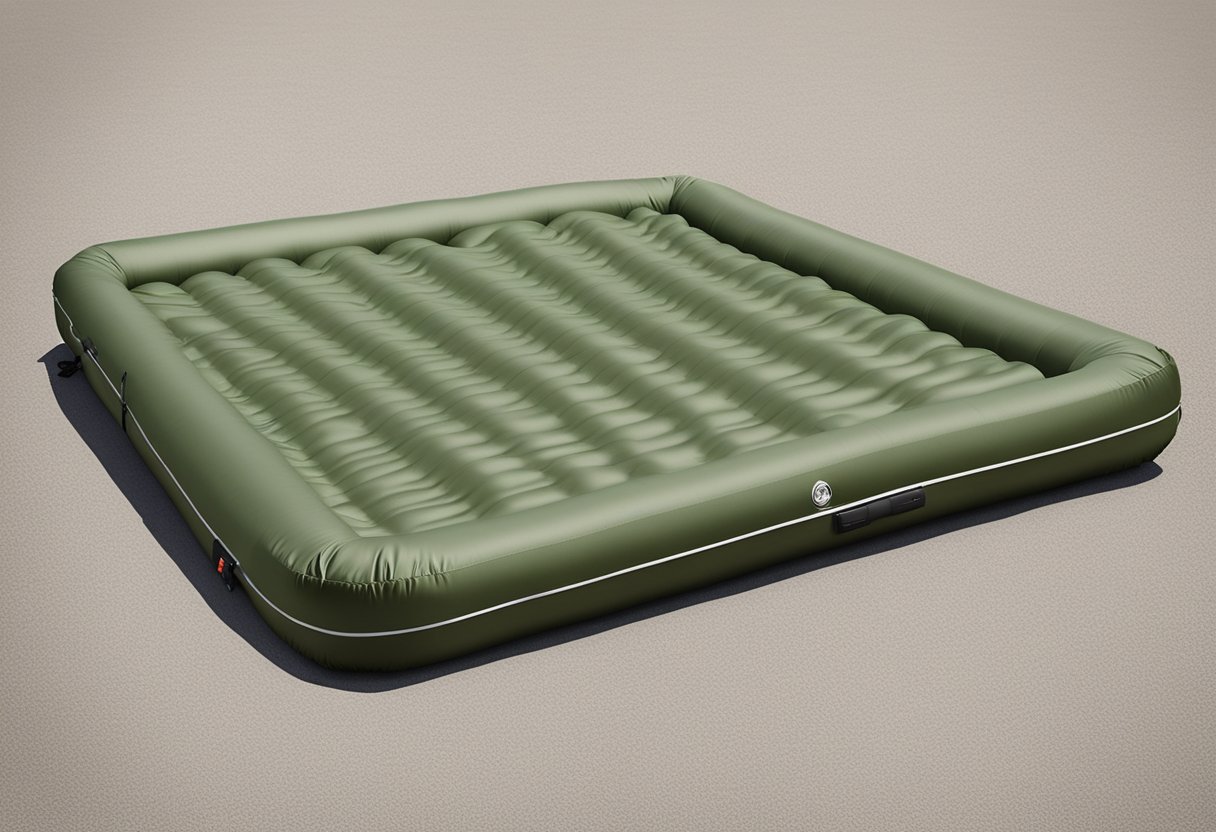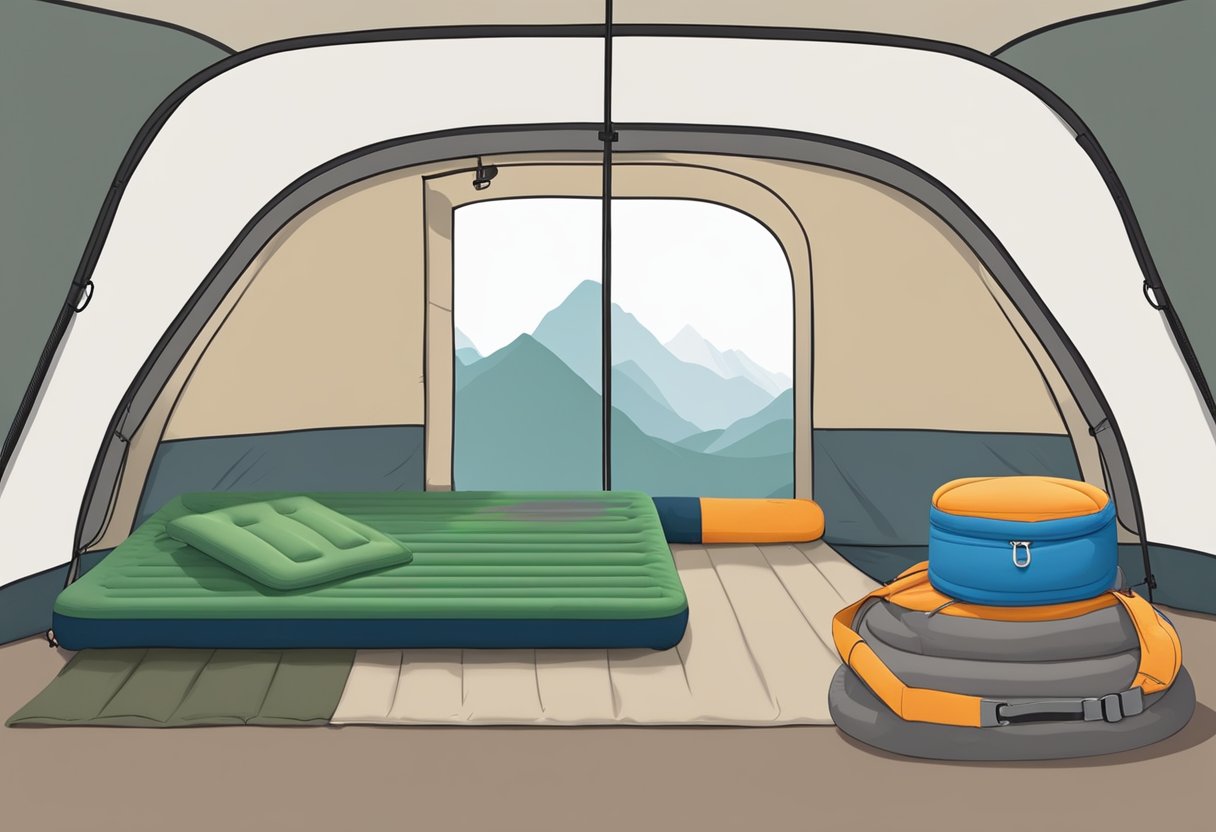When it comes to camping, having a comfortable sleeping arrangement is crucial. Two popular options for sleeping in the great outdoors are camping pads and air mattresses. While both provide a cushioned surface to sleep on, there are some key differences to consider before making your choice.

Camping pads are typically thinner and more lightweight than air mattresses, making them a great option for backpacking trips where weight is a concern. They are also more durable and less likely to puncture or leak. On the other hand, air mattresses provide a more luxurious sleeping experience with their thicker, softer surface. They are a great option for car camping or other trips where weight is not a concern. However, they are more prone to punctures and leaks, which can be a hassle to repair in the middle of a camping trip.
Understanding the Basics
When it comes to camping gear, sleeping pads and air mattresses are two of the most popular options for a comfortable night’s sleep in the great outdoors. Each type of sleeping surface has its own unique advantages and disadvantages, and choosing the right one for your needs depends on a variety of factors. In this section, we will explore the basics of sleeping pads and air mattresses to help you make an informed decision.
Sleeping Pad Types
Sleeping pads come in a variety of designs, each with its own set of features and benefits. The most common types of sleeping pads include:
-
Closed-cell foam pads: These pads are made from dense foam that is lightweight and durable. They are typically the most affordable option and provide good insulation, but they are not as comfortable as other types of sleeping pads.
-
Self-inflating pads: These pads have an open-cell foam core that self-inflates when the valve is opened. They are more comfortable than closed-cell foam pads and provide better insulation, but they are heavier and bulkier.
-
Inflatable pads: These pads are filled with air and can be inflated manually or with a pump. They are the most comfortable option and provide good insulation, but they are the heaviest and most expensive type of sleeping pad.
Air Mattress Fundamentals
Air mattresses are similar to the ones you might use in your home, but they are designed specifically for camping. They are typically made from durable materials like PVC or nylon and come in a variety of sizes and thicknesses. Here are some key things to keep in mind when shopping for an air mattress:
-
Design: Air mattresses can be designed with either internal or external pumps. Internal pumps are built into the mattress and are more convenient, while external pumps are separate and require more effort to use.
-
Foam: Some air mattresses come with a layer of foam on top for added comfort and insulation. This can be a good option if you are camping in colder weather.
-
Inflatable: Air mattresses are filled with air and can be inflated manually or with a pump. Make sure to choose a mattress that is easy to inflate and deflate.
-
Insulation: Air mattresses do not provide as much insulation as sleeping pads, so it’s important to choose a mattress with a high R-value if you will be camping in colder weather.
By understanding the basics of sleeping pads and air mattresses, you can make an informed decision about which option is right for your camping needs. Whether you choose a lightweight closed-cell foam pad or a luxurious air mattress with a built-in pump, you can rest easy knowing that you have the right gear for a comfortable night’s sleep in the great outdoors.
Comparing Comfort and Insulation
When it comes to camping, getting a good night’s sleep is crucial for enjoying your trip. Comfort and insulation are two important factors to consider when choosing between a sleeping pad and an air mattress.
Sleeping Pad Comfort
Sleeping pads are designed to provide cushioning and support while you sleep. They come in a variety of thicknesses and materials, from thin foam pads to self-inflating pads with air chambers. Thicker pads generally provide more cushioning, while thinner pads are more lightweight and easier to pack.
One advantage of sleeping pads is that they are typically more stable than air mattresses, which can shift and move as you sleep. This can be especially important if you’re a side sleeper or tend to move around a lot at night.
Air Mattress Comfort
Air mattresses are often more comfortable than sleeping pads, as they can be inflated to your desired level of firmness. They also provide more cushioning than most sleeping pads, which can be especially important if you have a bad back or are a side sleeper.
One downside of air mattresses is that they can be bulky and heavy, making them more difficult to pack and transport than sleeping pads. They can also be more prone to leaks and punctures, which can be a problem if you’re camping in rough terrain.
Insulation and Warmth
When it comes to insulation and warmth, both sleeping pads and air mattresses have their pros and cons. Sleeping pads generally have a lower R-value (a measure of thermal resistance) than air mattresses, which can make them less warm in cold weather. However, sleeping pads are often more effective at trapping your body heat close to your skin, which can help keep you warm.
Air mattresses, on the other hand, are often more effective at insulating you from the cold ground, as they provide a thicker layer of cushioning between you and the ground. However, they can also be more prone to cold spots, especially if they are underinflated or if you’re sleeping on a rough or uneven surface.
Overall, when it comes to comfort and insulation, both sleeping pads and air mattresses have their pros and cons. It’s important to choose the option that best suits your needs and preferences, based on factors such as your sleeping style, the weather conditions, and the terrain you’ll be camping on.
Analyzing Portability and Convenience

When it comes to camping and backpacking, portability and convenience are two crucial factors to consider while choosing between a camping sleeping pad and an air mattress. In this section, we will analyze how these factors impact your camping experience.
Camping and Backpacking Relevance
If you are planning to go camping or backpacking, portability is a major concern. A sleeping pad is lightweight and can easily be carried in a backpack. It is also compact and can be easily packed down. On the other hand, an air mattress is bulkier and heavier, making it less suitable for backpacking. It is more convenient for car camping, where you do not have to worry about the weight and size of your gear.
Ease of Use and Setup
Setting up a sleeping pad is relatively easy. You can simply unroll it and inflate it manually or with an air pump. It takes only a few minutes to set up and pack down. An air mattress, on the other hand, requires an air pump to inflate it. This can be time-consuming and inconvenient, especially if you do not have access to an electrical outlet.
In terms of ease of use, a sleeping pad is more convenient than an air mattress. It does not require any special equipment and can be set up quickly. An air mattress, on the other hand, requires an air pump and can be time-consuming to inflate.
When it comes to portability and convenience, a camping sleeping pad is the clear winner. It is lightweight, compact, and easy to set up. However, an air mattress is more comfortable and convenient for car camping. Ultimately, the decision between a camping sleeping pad and an air mattress depends on your personal preferences and camping style.
Evaluating Durability and Value

When it comes to camping gear, durability and value are two crucial factors to consider. In this section, we will take a closer look at the material and build quality of camping pads and air mattresses, as well as their cost-efficiency.
Material and Build Quality
Camping pads and air mattresses are typically made from PVC, nylon, or polyester. PVC is the most durable material, but it is also the heaviest and bulkiest. Nylon is lightweight and durable, but it is more prone to leaks and punctures. Polyester strikes a balance between durability and weight, making it a popular choice for camping gear.
When it comes to build quality, camping pads are generally more durable than air mattresses. They are designed to withstand rough terrain and can handle more weight without losing their shape. Air mattresses, on the other hand, are more prone to punctures and leaks, which can significantly reduce their longevity.
Cost-Efficiency
When evaluating the cost-efficiency of camping pads and air mattresses, it is essential to consider the value for money they offer. Camping pads are typically more affordable than air mattresses, but they also have a shorter lifespan. Air mattresses, on the other hand, are more expensive, but they offer superior comfort and longevity.
In terms of value for money, camping pads are ideal for occasional campers or those on a tight budget. They are also a great option for backpackers who need to keep their gear lightweight. Air mattresses are best suited for car camping, where weight and size are not as much of a concern. They are also a good investment for frequent campers who want a comfortable and durable sleeping surface.
In conclusion, when evaluating the durability and value of camping pads and air mattresses, it is essential to consider the material and build quality, as well as the cost-efficiency. By taking these factors into account, you can choose the right sleeping surface for your camping needs.
The Verdict
Pros and Cons Summary
After comparing the pros and cons of camping pads and air mattresses, you may be wondering which one is the best option for you. Here’s a summary of the advantages and disadvantages of each:
Camping Pads
Pros:
- Lightweight and compact for easy transport
- Provides excellent insulation and warmth
- Durable and long-lasting
- Affordable option for budget-conscious campers
Cons:
- May not be as comfortable as air mattresses
- Limited thickness options
- May require manual inflation
Air Mattresses
Pros:
- Provides a more comfortable sleeping experience
- Offers a wider range of thickness options
- Easy to inflate and deflate
- Can be used for indoor and outdoor sleeping
Cons:
- May be more expensive than camping pads
- Heavier and bulkier for transport
- May be less durable and prone to punctures
FAQs
Which is more comfortable, camping pads or air mattresses?
Air mattresses are generally considered more comfortable than camping pads due to their thicker cushioning and adjustable firmness. However, camping pads offer excellent insulation and warmth, making them a great option for cold weather camping.
Are camping pads more durable than air mattresses?
Yes, camping pads are generally more durable and long-lasting than air mattresses. They are less prone to punctures and can withstand rough terrain and heavy use.
Are air mattresses affordable?
Air mattresses can range in price from affordable to expensive, depending on the brand and features. If you’re on a budget, camping pads may be a more affordable option.
Is an air mattress a luxury item for camping?
An air mattress can be considered a luxury item for camping due to its comfortable and convenient features. However, it is not a necessity for a successful camping trip and may not be suitable for all camping situations.
What is the verdict on camping pads vs air mattresses?
Ultimately, the decision between camping pads and air mattresses comes down to personal preference and camping needs. If you prioritize comfort and don’t mind the extra weight and cost, an air mattress may be the best option for you. However, if you prioritize durability, insulation, and affordability, a camping pad may be the better choice.